Module 1 How to learn English Unit 3 Language in use课时作业课件(共23张PPT)
文档属性
| 名称 | Module 1 How to learn English Unit 3 Language in use课时作业课件(共23张PPT) | 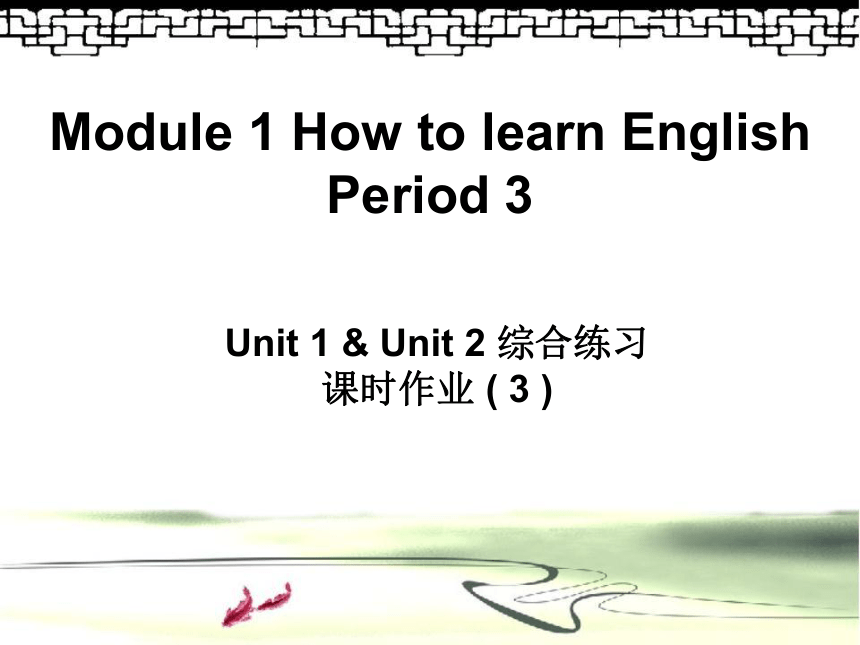 | |
| 格式 | ppt | ||
| 文件大小 | 642.5KB | ||
| 资源类型 | 教案 | ||
| 版本资源 | 外研版 | ||
| 科目 | 英语 | ||
| 更新时间 | 2022-07-28 15:28:41 | ||
图片预览

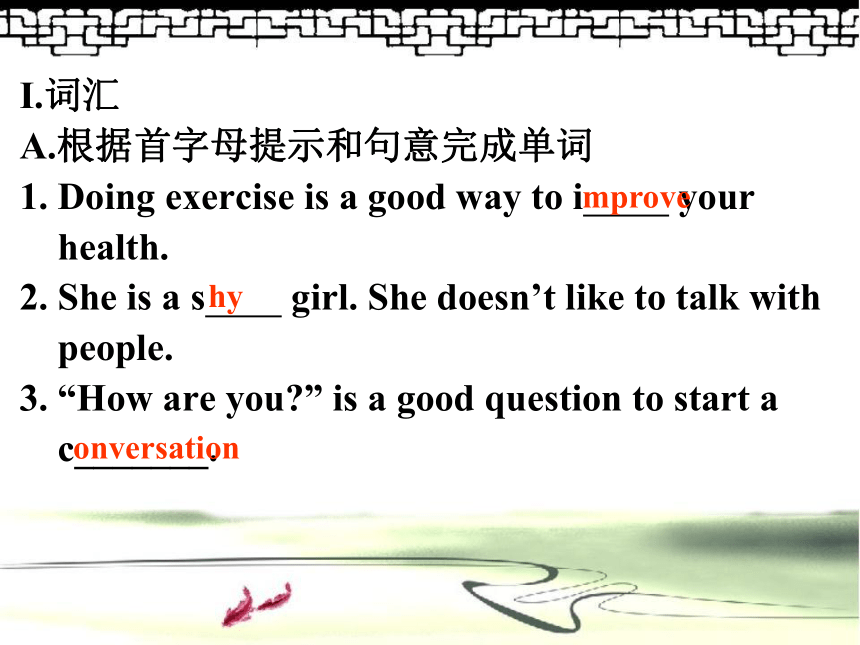
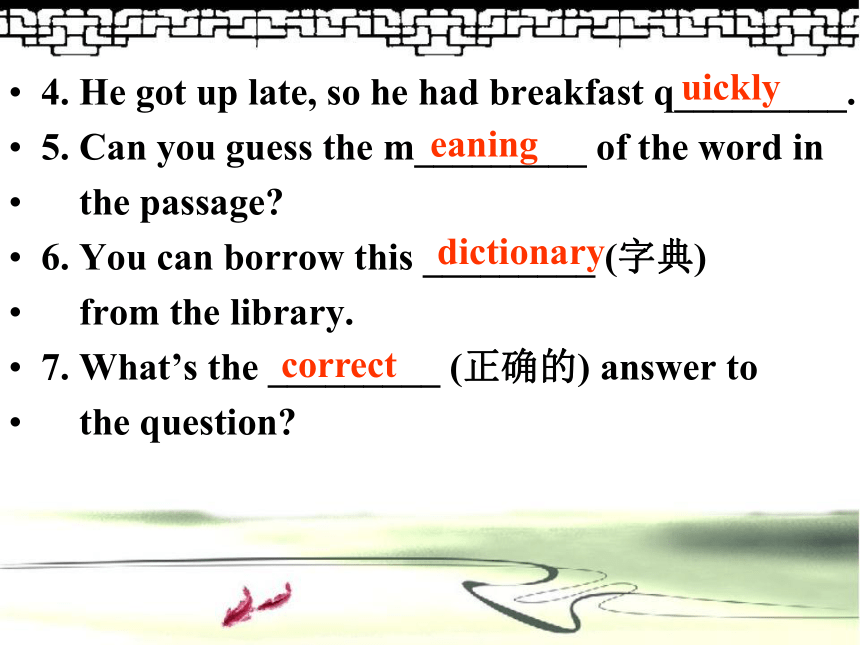
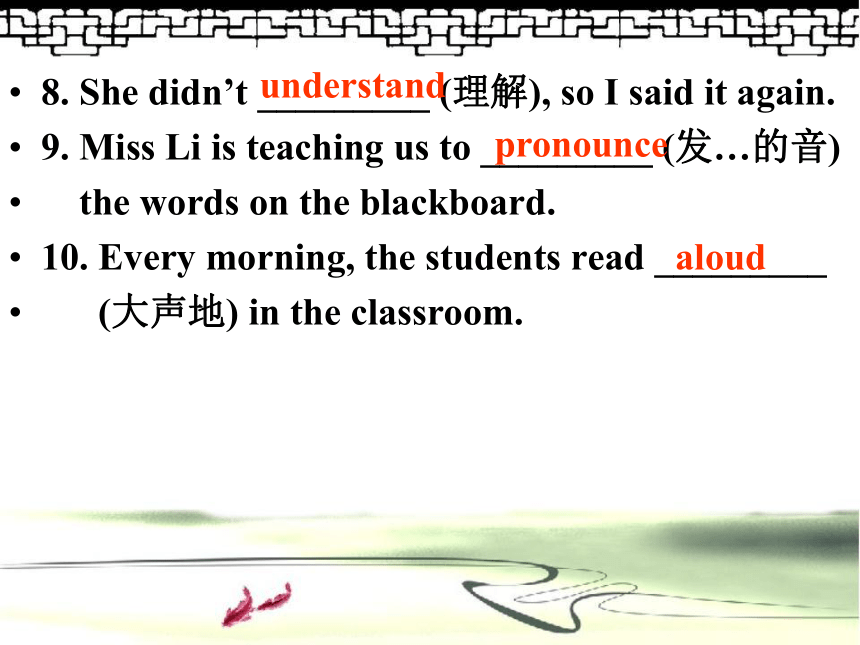
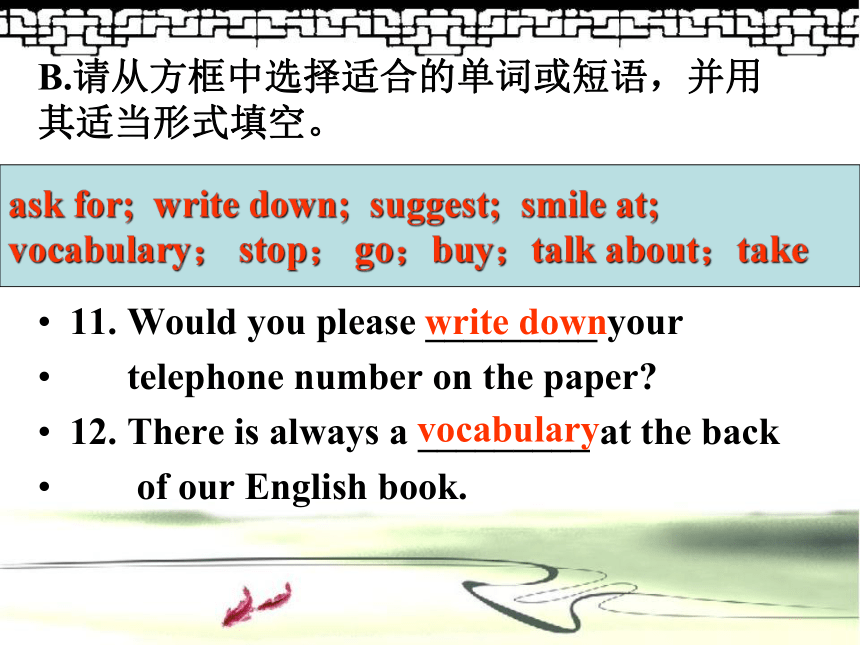

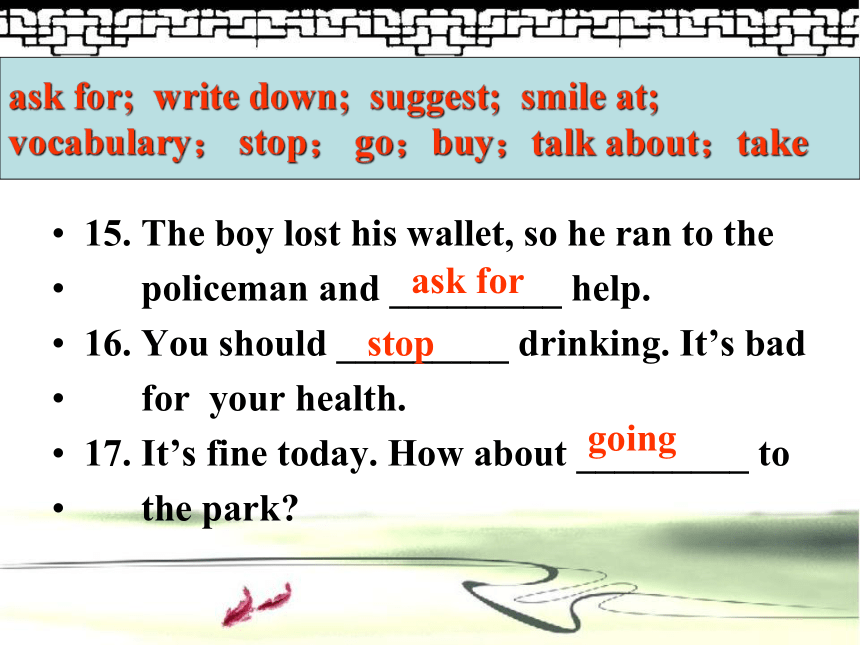
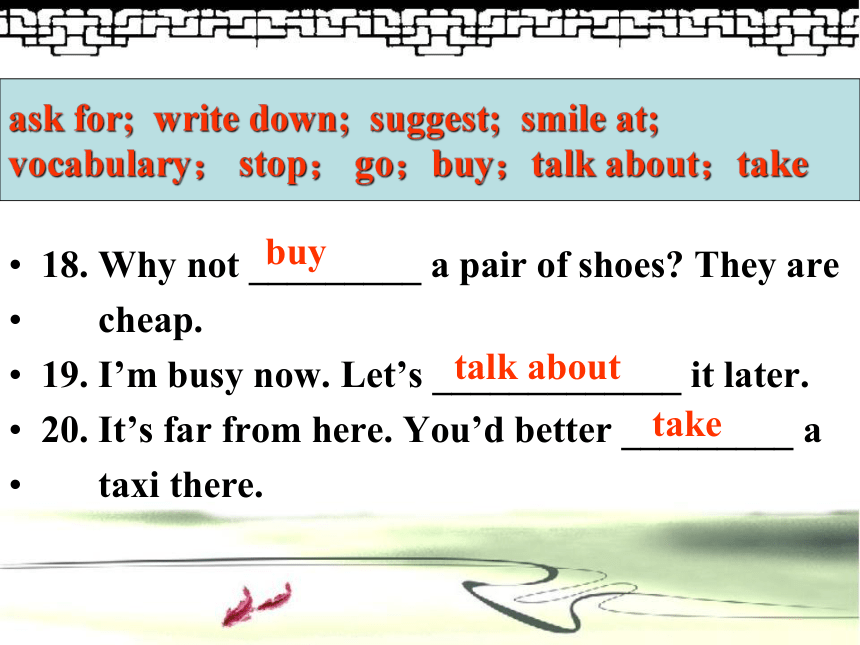
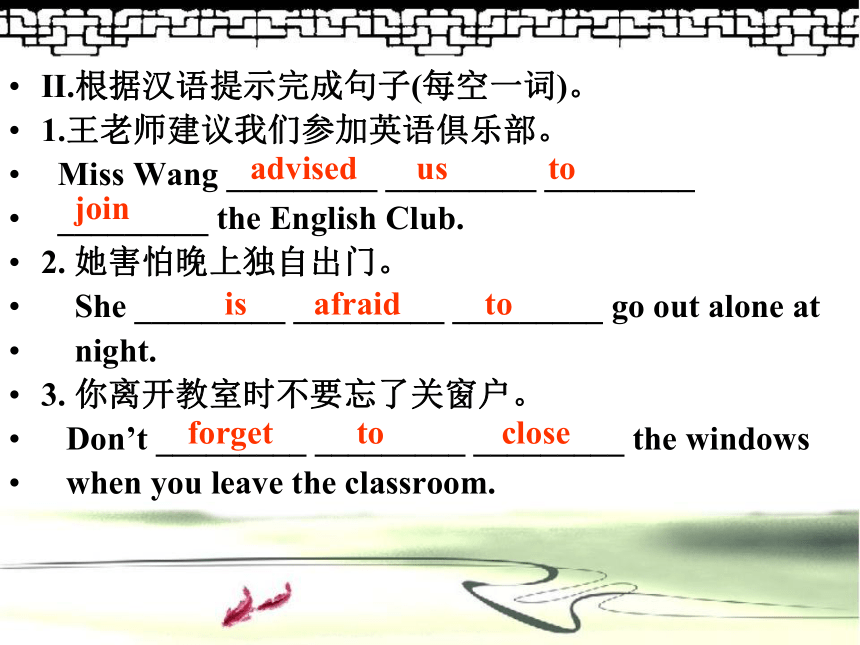
文档简介
(共23张PPT)
Module 1 How to learn English Period 3
Unit 1 & Unit 2 综合练习
课时作业 ( 3 )
I.词汇
A.根据首字母提示和句意完成单词
1. Doing exercise is a good way to i your
health.
2. She is a s girl. She doesn’t like to talk with
people.
3. “How are you ” is a good question to start a
c_______.
mprove
hy
onversation
4. He got up late, so he had breakfast q_________.
5. Can you guess the m_________ of the word in
the passage
6. You can borrow this _________ (字典)
from the library.
7. What’s the _________ (正确的) answer to
the question
uickly
eaning
dictionary
correct
8. She didn’t _________ (理解), so I said it again.
9. Miss Li is teaching us to _________ (发…的音)
the words on the blackboard.
10. Every morning, the students read _________
(大声地) in the classroom.
understand
pronounce
aloud
11. Would you please _________ your
telephone number on the paper
12. There is always a _________ at the back
of our English book.
B.请从方框中选择适合的单词或短语,并用其适当形式填空。
ask for; write down; suggest; smile at;
vocabulary; stop; go;buy;talk about;take
write down
vocabulary
13. Mary is not happy today, and she
doesn’t _________ us.
14. I _________ we go to the English corner
to practise English.
ask for; write down; suggest; smile at;
vocabulary; stop; go;buy;talk about;take
smile at
suggest
15. The boy lost his wallet, so he ran to the
policeman and _________ help.
16. You should _________ drinking. It’s bad
for your health.
17. It’s fine today. How about _________ to
the park
ask for; write down; suggest; smile at;
vocabulary; stop; go;buy;talk about;take
ask for
stop
going
18. Why not _________ a pair of shoes They are
cheap.
19. I’m busy now. Let’s _____________ it later.
20. It’s far from here. You’d better _________ a
taxi there.
ask for; write down; suggest; smile at;
vocabulary; stop; go;buy;talk about;take
buy
talk about
take
Ⅱ.根据汉语提示完成句子(每空一词)。
1.王老师建议我们参加英语俱乐部。
Miss Wang _________ _________ _________
_________ the English Club.
2. 她害怕晚上独自出门。
She _________ _________ _________ go out alone at
night.
3. 你离开教室时不要忘了关窗户。
Don’t _________ _________ _________ the windows
when you leave the classroom.
advised us to
join
is afraid to
forget to close
4. 讲英语时犯错误是正常的。
_________ _________ to _________ _________ when
speaking English.
5. 听广播和看电影是放松的好方法。
_________ _________ _________ _________ and
watching TV is a good way to relax.
It’s natural make mistakes
Listening to the radio
III. 根据本模块Unit 1的内容完成对话。
In class, Ms James and her students are talking about
good ways to learn English. Here is some 1. a_________
on how to improve English. First, try to 2. s_________
English in class as much as possible. Second, get a
notebook and write down the 3. m_________ idea.
Third, listen to the 4.r_________ or read English
newspapers often. Finally, try to make English 5.
p_________ friends and write to each other in English.
It’s good for writing. Ms James thinks all these are
helpful for learning English.
1._________ 2. _________ 3. _________4._________ 5._________
dvice
adio
en
ain
peak
IV. 按要求完成下列句子
1. She likes to draw pictures. (改为否定句)
She _____ _____ to draw pictures.
2. Will they go to the beach this weekend (做否定回答)
____, _____ _____.
3. We are going to have an English party
tomorrow morning. (改为一般疑问句)
____ ____ ______ to have an English
party tomorrow morning.
Are you going
No they won’t
doesn’t like
4. Jill is practicing English in the English club.
(对划线部分提问)
______ is Jill _____ in the English club
5. He waits for me two hours yesterday, but I
don’t come. (写出正确的句子)
He ______ for me two hours yesterday, but I
______ _______.
waited
What doing
didn’t come
V. 情景交际
根据对话内容选择恰当选项,有两个多余选项。
A: Are you OK 1. _________
B: I’m afraid of the coming English test. I don’t know
what to do.
A: 2. _________
B: I’m not good at listening.
A: 3. _________
B: It’s a good idea. 4. _________
A: You can write down new words in a notebook and
then pronounce them often.
B. I’ll do it. Thanks.
A: Can you understand what foreigners say when they talk to you
B: A little. 5. _________
A: You’d better go to the English Corner to practice your
speaking and listening.
A
G
E
F
C
A. You look so worried.
B. Don’t worry about me.
C. What’s your problem in English
D. But they speak really fast. I can’t understand them.
E. And I always forget new words easily.
F. I think you should listen to English tapes every day.
G. Can you help me with my English
You’d better (not) do sth.
你最好(不)做某事。
You’d better = You had better
had better “最好” 后面接动词原形。
e.g. You’d better wash your hands before a meal.
饭前你最好先洗手。
You’d better finish your homework before
going to bed.
睡觉之前你最好先完成作业。
You’d better not go out at midnight.
午夜时分你最好不要外出。
VI. 单项选择
1. --You made some spelling _________ in your homework.
-- Sorry, I won’t do that again.
A. changes B. mistakes C. answers D. notes
2. The question is too difficult for the students. No one can work out the _______ answer.
A. sure B. basic C. correct D. clear
3. There are a few new words in this passage. I will _________ in the dictionary.
A. look it up B. look them up
C. look up it D. look up them
4. I can’t hear you clearly. Could you please read the news _________
A. differently B. quickly C. carefully D. aloud
5. Hold on the phone for a second. Let me find a pen to _________ your phone number.
A. look for B. point at C. write down D. take out
6. Gina looks sad because she forgot _________ a present for her friend.
A. buying B. to buy C. bought D. buy
7. If you want to speak English better, you
should practice speaking it _________.
A. as many as you can B. as much as possible
C. as quick as you can D. as soon as possible
8. The baby is sleeping. I think we _________
turn down the music.
A. should B. could C. might D. would
9. – Where are the children
-- Oh, they _________ a PE class on the
playground.
A. have B. had C. are having D. will have
10. -- There will be a concert this evening. Let’s go
there together.
-- _________ I have to go the train station to
see my friends off.
A. Have a good time! B. Thank you very much.
C. Yes, I’d love to. D. Sorry, I’m afraid not.
VII. 完形填空
Liu Xu met a robber (抢劫犯) yesterday. The 13-year-
old boy was 1 home when a man suddenly jumped out
from the roadside. 2 pulled Liu off his bike and rode
away. Liu was 3 but he didn’t run after the robber.
He found a telephone and called 4 .
“Safety (安全) is the most important” Liu said,
remembering what his teacher had told him in his first
aid(急救) class.“It is not safe to run after a man who is
much stronger than you.”
Liu is a junior student at Shenzhen Bao’an Middle
School in Guangdong. His 5 is one of the first in China
to have first aid education. Junior 1 students at the
school must take the class once a week. The first aid 6
are to teach students skills so that they can protect and
save themselves.
Students at Bao’an often learn by role-playing in first aid classes. “I acted as a stranger knocking at the 7 . A classmate stood inside the door and asked several questions before letting me in. Then we changed roles and did it again,” Zhou Min, 12, said. “We learned 8 while having fun at role-playing.”
“The 9 told us that we should try not to go out alone. If someone tries to do bad things to us, we may hit their eyes or noses. Then we should run into a crowded (拥挤的) place 10 ,” said Zhong Hua, a 13-year-old girl.
( )1. A. walking B. riding C. driving D. running
( )2. A. He B. She C. They D. We
( )3. A. bored B. happy C. afraid D. interested
( )4. A. 110 B. 120 C. 114 D. 119
( )5. A. hospital B. house C. school D. family
( )6. A. classes B. books C. articles D. news
( )7. A. window B. table C. chair D. door
( )8. A. little B. a lot C. nothing D. a bit
( )9. A. teacher B. police C. doctor D. parent
( )10. A. quietly B. quickly C. suddenly D. clearly
Module 1 How to learn English Period 3
Unit 1 & Unit 2 综合练习
课时作业 ( 3 )
I.词汇
A.根据首字母提示和句意完成单词
1. Doing exercise is a good way to i your
health.
2. She is a s girl. She doesn’t like to talk with
people.
3. “How are you ” is a good question to start a
c_______.
mprove
hy
onversation
4. He got up late, so he had breakfast q_________.
5. Can you guess the m_________ of the word in
the passage
6. You can borrow this _________ (字典)
from the library.
7. What’s the _________ (正确的) answer to
the question
uickly
eaning
dictionary
correct
8. She didn’t _________ (理解), so I said it again.
9. Miss Li is teaching us to _________ (发…的音)
the words on the blackboard.
10. Every morning, the students read _________
(大声地) in the classroom.
understand
pronounce
aloud
11. Would you please _________ your
telephone number on the paper
12. There is always a _________ at the back
of our English book.
B.请从方框中选择适合的单词或短语,并用其适当形式填空。
ask for; write down; suggest; smile at;
vocabulary; stop; go;buy;talk about;take
write down
vocabulary
13. Mary is not happy today, and she
doesn’t _________ us.
14. I _________ we go to the English corner
to practise English.
ask for; write down; suggest; smile at;
vocabulary; stop; go;buy;talk about;take
smile at
suggest
15. The boy lost his wallet, so he ran to the
policeman and _________ help.
16. You should _________ drinking. It’s bad
for your health.
17. It’s fine today. How about _________ to
the park
ask for; write down; suggest; smile at;
vocabulary; stop; go;buy;talk about;take
ask for
stop
going
18. Why not _________ a pair of shoes They are
cheap.
19. I’m busy now. Let’s _____________ it later.
20. It’s far from here. You’d better _________ a
taxi there.
ask for; write down; suggest; smile at;
vocabulary; stop; go;buy;talk about;take
buy
talk about
take
Ⅱ.根据汉语提示完成句子(每空一词)。
1.王老师建议我们参加英语俱乐部。
Miss Wang _________ _________ _________
_________ the English Club.
2. 她害怕晚上独自出门。
She _________ _________ _________ go out alone at
night.
3. 你离开教室时不要忘了关窗户。
Don’t _________ _________ _________ the windows
when you leave the classroom.
advised us to
join
is afraid to
forget to close
4. 讲英语时犯错误是正常的。
_________ _________ to _________ _________ when
speaking English.
5. 听广播和看电影是放松的好方法。
_________ _________ _________ _________ and
watching TV is a good way to relax.
It’s natural make mistakes
Listening to the radio
III. 根据本模块Unit 1的内容完成对话。
In class, Ms James and her students are talking about
good ways to learn English. Here is some 1. a_________
on how to improve English. First, try to 2. s_________
English in class as much as possible. Second, get a
notebook and write down the 3. m_________ idea.
Third, listen to the 4.r_________ or read English
newspapers often. Finally, try to make English 5.
p_________ friends and write to each other in English.
It’s good for writing. Ms James thinks all these are
helpful for learning English.
1._________ 2. _________ 3. _________4._________ 5._________
dvice
adio
en
ain
peak
IV. 按要求完成下列句子
1. She likes to draw pictures. (改为否定句)
She _____ _____ to draw pictures.
2. Will they go to the beach this weekend (做否定回答)
____, _____ _____.
3. We are going to have an English party
tomorrow morning. (改为一般疑问句)
____ ____ ______ to have an English
party tomorrow morning.
Are you going
No they won’t
doesn’t like
4. Jill is practicing English in the English club.
(对划线部分提问)
______ is Jill _____ in the English club
5. He waits for me two hours yesterday, but I
don’t come. (写出正确的句子)
He ______ for me two hours yesterday, but I
______ _______.
waited
What doing
didn’t come
V. 情景交际
根据对话内容选择恰当选项,有两个多余选项。
A: Are you OK 1. _________
B: I’m afraid of the coming English test. I don’t know
what to do.
A: 2. _________
B: I’m not good at listening.
A: 3. _________
B: It’s a good idea. 4. _________
A: You can write down new words in a notebook and
then pronounce them often.
B. I’ll do it. Thanks.
A: Can you understand what foreigners say when they talk to you
B: A little. 5. _________
A: You’d better go to the English Corner to practice your
speaking and listening.
A
G
E
F
C
A. You look so worried.
B. Don’t worry about me.
C. What’s your problem in English
D. But they speak really fast. I can’t understand them.
E. And I always forget new words easily.
F. I think you should listen to English tapes every day.
G. Can you help me with my English
You’d better (not) do sth.
你最好(不)做某事。
You’d better = You had better
had better “最好” 后面接动词原形。
e.g. You’d better wash your hands before a meal.
饭前你最好先洗手。
You’d better finish your homework before
going to bed.
睡觉之前你最好先完成作业。
You’d better not go out at midnight.
午夜时分你最好不要外出。
VI. 单项选择
1. --You made some spelling _________ in your homework.
-- Sorry, I won’t do that again.
A. changes B. mistakes C. answers D. notes
2. The question is too difficult for the students. No one can work out the _______ answer.
A. sure B. basic C. correct D. clear
3. There are a few new words in this passage. I will _________ in the dictionary.
A. look it up B. look them up
C. look up it D. look up them
4. I can’t hear you clearly. Could you please read the news _________
A. differently B. quickly C. carefully D. aloud
5. Hold on the phone for a second. Let me find a pen to _________ your phone number.
A. look for B. point at C. write down D. take out
6. Gina looks sad because she forgot _________ a present for her friend.
A. buying B. to buy C. bought D. buy
7. If you want to speak English better, you
should practice speaking it _________.
A. as many as you can B. as much as possible
C. as quick as you can D. as soon as possible
8. The baby is sleeping. I think we _________
turn down the music.
A. should B. could C. might D. would
9. – Where are the children
-- Oh, they _________ a PE class on the
playground.
A. have B. had C. are having D. will have
10. -- There will be a concert this evening. Let’s go
there together.
-- _________ I have to go the train station to
see my friends off.
A. Have a good time! B. Thank you very much.
C. Yes, I’d love to. D. Sorry, I’m afraid not.
VII. 完形填空
Liu Xu met a robber (抢劫犯) yesterday. The 13-year-
old boy was 1 home when a man suddenly jumped out
from the roadside. 2 pulled Liu off his bike and rode
away. Liu was 3 but he didn’t run after the robber.
He found a telephone and called 4 .
“Safety (安全) is the most important” Liu said,
remembering what his teacher had told him in his first
aid(急救) class.“It is not safe to run after a man who is
much stronger than you.”
Liu is a junior student at Shenzhen Bao’an Middle
School in Guangdong. His 5 is one of the first in China
to have first aid education. Junior 1 students at the
school must take the class once a week. The first aid 6
are to teach students skills so that they can protect and
save themselves.
Students at Bao’an often learn by role-playing in first aid classes. “I acted as a stranger knocking at the 7 . A classmate stood inside the door and asked several questions before letting me in. Then we changed roles and did it again,” Zhou Min, 12, said. “We learned 8 while having fun at role-playing.”
“The 9 told us that we should try not to go out alone. If someone tries to do bad things to us, we may hit their eyes or noses. Then we should run into a crowded (拥挤的) place 10 ,” said Zhong Hua, a 13-year-old girl.
( )1. A. walking B. riding C. driving D. running
( )2. A. He B. She C. They D. We
( )3. A. bored B. happy C. afraid D. interested
( )4. A. 110 B. 120 C. 114 D. 119
( )5. A. hospital B. house C. school D. family
( )6. A. classes B. books C. articles D. news
( )7. A. window B. table C. chair D. door
( )8. A. little B. a lot C. nothing D. a bit
( )9. A. teacher B. police C. doctor D. parent
( )10. A. quietly B. quickly C. suddenly D. clearly
同课章节目录
- Module 1 How to learn English
- Unit 1 Let's try to speak English as much as possi
- Unit 2 You should smile at her.
- Unit 3 Language in use .
- Module 2 My home town and my country
- Unit 1 It's taller than many other buildings.
- Unit 2 Cambridge is a beautiful city in the east o
- Unit 3 Language in use .
- Module 3 Sports.
- Unit 1 Nothing is more exciting than playing tenni
- Unit 2 This year we training more carefully.
- Unit 3 Language in use .
- Module 4 Planes, ships and trains .
- Unit 1 He lives the farthest from school.
- Unit 2 What is the best way to travel.
- Unit 3 Language in use .
- Module 5 Lao She Teahouse.
- Unit 1 I wanted to see the Beijing Opera.
- Unit 2 It descibes the changes in Chinese society.
- Unit 3 Language in use .
- Module 6 Animals in danger.
- Unit 1 It allows people to get closer to them .
- Unit 2 The WWF is working hard to save them all.
- Unit 3 Language in use .
- Revision module A
- Module 7 A famous story
- Unit 1 Alice was sitting with her sister by the ri
- Unit 2 She was thinking about her cat.
- Unit 3 Language in use .
- Module 8 Accidents
- Unit 1 While the car were changing to red, a car s
- Unit 2 I was trying to pick it up when it bite me
- Unit 3 Language in use .
- Module 9 Population
- Unit 1 The population of China is about 1.37 billi
- Unit 2 Arnwick was a city with 200,000 people.
- Unit 3 Language in use .
- Module 10 The weathe
- Unit 1 It might snow.
- Unit 2 The weather is fine all year round.
- Unit 3 Language in use .
- Module 11 Way of life
- Unit 1 In China ,we open a gift later.
- Unit 2 In England, you usually drink tea with milk
- Unit 3 Language in use .
- Module 12 Help
- Unit 1 What should we do before help arrives?
- Unit 2 Stay away from windows and heavy furniture.
- Unit 3 Language in use .
- Revision module B
